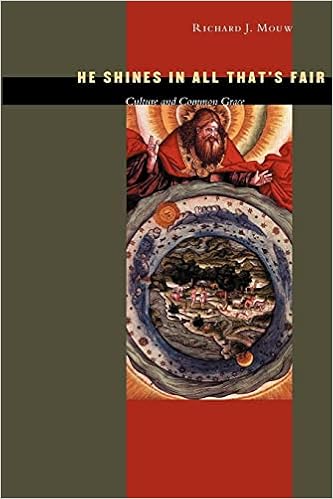By: Richard J. Mouw (Wm. B. Eerdmans Publishing Co., 2002)

Most titles I review in these “Of Note”s are of my own making. I create them with a number of different purposes, but mostly to signal to the reader something of what I think the author of the book or article, or in the case of a movie, the director, is getting at in his or her work.
For this Note, though, I simply repeat the title of the work because it says everything that needs to be said about the subject of this little jewel of a book, and it says it with a beautiful lightness and joy that I cannot better. In fact Richard Mouw got the title himself from a wonderful old hymn, so the process of creating and appropriating (should I say “stealing”?) reaches back well before Mouw wrote the lectures presented here.
Even that makes sense because, as he points out very early on, his topic is an ancient and thoroughly discussed one: common grace. The phrase refers to the question: If devotion, or lack thereof, to Christ is that which most fundamentally separates human beings, how do we understand what Christians and non-Christians have in common? The questions are huge and various: How does one distinguish between Christian and non-Christian in the first place? Should Christians work alongside non-Christians? If so, at what tasks? If not, how does one live in the world? If all truth and knowledge comes ultimately from the Creator, how do we understand the function of these ideas in the practice of everything from business to law to medicine to education to art in the building of society in which two such radically different groups reside?
Richard Mouw has given us a great gift in these Stob lectures because this slim volume reads so clearly, so cogently, yet is so deep in its reference to so many of the dimensions of this topic that anyone from the proverbial farmer behind the plow to the erudite scholar in a book-lined office can read it with real benefit. Mouw has shown this gift in his other books on topics like civility and the Christian mind, but nowhere does he achieve that depth and breadth as well as here. With chapter titles like ‘Lessons from the “Labadists”’, and ‘”Infra” versus “Supra”’, one might think this volume to be only digestible by those who have been at the table for many years and with deep experience of the meal, but this is not so. Mouw’s typical autobiographical style and crisp, jargon-avoiding sentences allow everyone to eat of this rich feast.
Particularly interesting for me was the chapter mentioned above, ‘”Infra” versus “Supra”’. The title is of course a reference to an oft-mentioned discussion, when the topic is abstract theology and accusations are being made of one being so “heavenly minded that you are no earthly good.” The two terms are shorthand for two different viewpoints concerning the fall of man, and what God’s involvement was in it. The question is framed clearly by Mouw:
The two positions as traditionally formulated propose two different sequences for God’s decisions to create the world, permit the fall of humankind, and elect some persons to eternal salvation while assigning others to reprobation. The supralapsarian insists that God first decreed that there would be a certain group of elect human beings and another group of reprobates; only then did God decide to make all of this happen by creating the world and permitting the fall into sin. Thus the decree of election and reprobation was prior to, or “supra,” the decision to permit the fall. Infralapsarians propose a different sequence: first God decided to create the world; then God decided to permit the fall; only after these decrees did the divine decision occur with regard to election and reprobation. Thus God’s electing and reprobating purposes were subordinate to, or “infra,” the decision to create a world that would come to be plagued by sin.
Of course the detailed unpacking of the importance of this distinction for understanding common grace is far too complicated for this space. Suffice it to say, Mouw argues carefully and brilliantly for the “infra” position and shows how it can be tied to themes of creation and redemption in ways that glorify God without making him the ogre some opponents of all lapsarian positions make Him out to be. In tightly-knit dialogue primarily with Karl Barth, he affirms the glory of God with humble piety, giving credit to supralapsarians where credit is due, and confessing where their arguments are compelling, if not finally convincing. This is the way theology is supposed to be written.
This book would serve admirably as the basis for an enlightening discussion of common grace with students and faculty of all types. Try it.
Drew Trotter